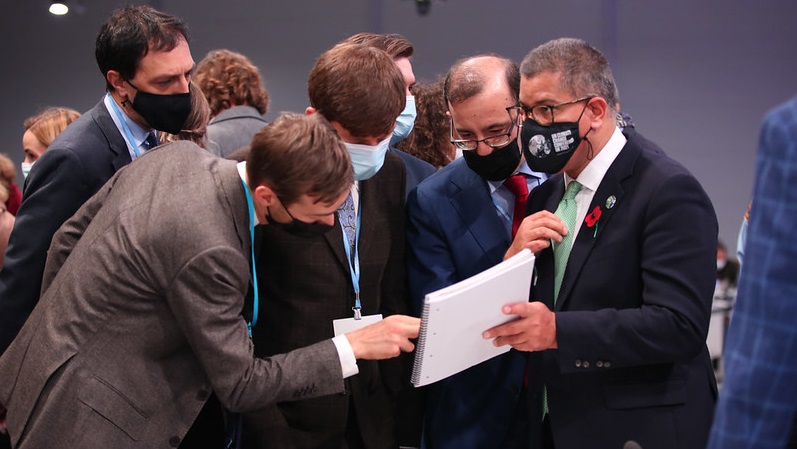The UK won friends and influence as Cop president, its not in its interest to throw that all away by abandoning its climate ambition
It has been a long half-year since the end of the UK’s Cop Presidency.
The Glasgow highpoint of our climate leadership has long since faded. So too have the heady days of the 2022 Conservative Party leadership elections, in which most candidates were content at least to hold the line on UK climate ambition, internationally and at home.
Our climate news now, insofar as it exists, is some combination of domestic nimby-ism, diplomatic disinterest, and new drilling.
Personally, I left the Cop26 President’s private office, where I worked as a speechwriter and private secretary, to continue the work from outside government at one of the UK’s largest philanthropic foundations.
Developing nations decry risk of UK breaking climate finance pledge
And it was my new role that took me to Paris last month, for the Macron-Mottley finance summit. More, of course, than can be said for the UK Prime Minister Rishi Sunak who choose instead to party with media mogul Rupert Murdoch.
The President of Kenya William Ruto has a reputation as an emerging voice on the international climate stage. That preceded him as he arrived at the Palais Brongniart in Paris.
So I was listening with interest as he spoke on what he believed to be the great collective failure in our attempts to tackle the climate crisis — our persistent belief that it could be done in a system built on national interest.
To paraphrase him, when global good competes with national interest, national interest wins before the morning’s out. In a somewhat indistinguishable flurry of panels and plenaries, it stuck out as a profound comment on our current state of play.
Governments set to fail to plot shipping industry course for 1.5C
But I think it’s worth all of us, and particularly those trying to make and influence climate policy in the UK, reflecting a little more on Ruto’s point.
At first glance, the current UK context seems to support the argument.
It would be an understatement to say that, in recent years, the going in the UK has got tough. My old thesis advisor, Adam Tooze, repopularised the idea of a global polycrisis.
And this has been felt keenly here in the UK in the interrelated cost of living and energy crises. What money the government has to spend overseas was first reduced in the face of domestic pressures, as the pandemic hit the economy, and has since been sucked towards Ukraine and the defence of democracy on not-so-distant shores.
Identifying loss and damage is tough – we need a pragmatic but science-based approach
Just, it seems, as Ruto warned. National interest winning before the morning is out.
A similar picture can be sketched across much of the Global North.
But I do not believe the UK’s stuttering leadership can truly be explained by Ruto’s global good versus national interest battle. The problem, instead, is a flawed and myopic understanding of one side of the equation.
We have to recognise that global climate leadership, backed by ambitious climate policy at home, is now fundamental to swathes of any governments agenda, whether in terms of geopolitical and diplomatic interests, security – economic and otherwise – or economics. The lines that could once be drawn between international policy and the domestic agenda, as far as I can see, no longer exist.
Threat of EU carbon tax prompts dubious “green aluminium” claims in Mozambique
In recognising this, it quickly follows that leadership on the global good of climate action is not in competition with national interest, it is central to it.
I saw this first-hand back when working for the Cop26 President, as we worked to drive forward the gains of the Glasgow Climate Pact and to build a coalition for ambitious and long-term climate action around the world.
I think back to one of the first working trips I joined having just started in the office. We spent three days in Turkiye, first spending a day a few hours’ drive from Ankara, visiting one of the world’s largest solar farms, before returning to the political capital to work with ministers and the First Lady, in support of their climate agenda.
Morocco’s centuries-old irrigation system under threat from climate change
From a position of serious climate credibility and a solid offer of support, relationships were deepened and connections were created.
There was a palpable level of trust running through each of the Cop President’s interactions. That not only moved our collective climate agenda forward, but also unlocked opportunities for UK renewable energy suppliers and manufacturers.
It also strengthened our Embassy’s position from which to engage across the whole suite of the UK-Turkiye agenda, including the tackling of cross-border crime. It was a trip in which global goods and national interests, on both sides, fit neatly hand in hand.
A few months later we were in Viet Nam, as the Cop26 President lent his support to the team of officials working to complete the final stages of negotiation on Viet Nam’s just energy transition partnership (JETP) – the deal whereby developed countries helped to finance the clean energy transition.
Our meeting with the Vietnamese Prime Minister, which was over an hour long and punctuated by three separate and warm embraces between the two politicians, similarly demonstrated the interaction of global climate cooperation and interests elsewhere.
Senegal shows African countries are not passive beneficiaries of climate finance
Of course each of the conversations on the JETP were ostensibly about coal and the energy transition. But they were equally, if oftentimes i
Read More

